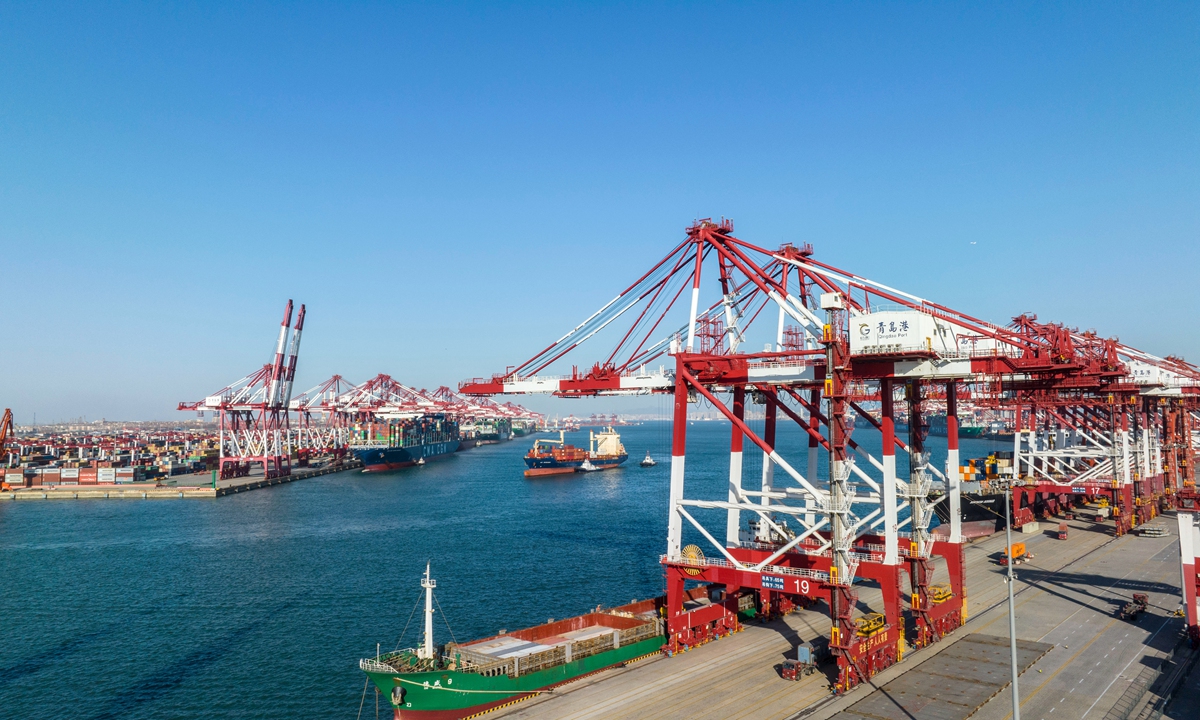
Photo shows the Qingdao Port in East China's Shandong Province. The port has fully established a "China-Japan-South Korea marine highway". Photo: VCG
With the Group of Seven (G7) countries at the Hiroshima summit aligned on a "de-risk, not decouple" approach toward China, some Western media outlets had claimed that Japan appears to be a beneficiary under this new development. However, the problem is what Japan is going to pay for "decoupling" from China.
A Sunday article, entitled "In Contrast to China, Japan at G-7 Basks in Newfound Appeal to Companies" from the Wall Street Journal, claimed that CEOs are warming to Japan because of G7 leaders' embrace of "de-risking and diversifying" from China as well as Japan's political stability and improving economic dynamism. Specifically, the article mentioned that memory-chip maker Micron Technology just said it would inject $3.6 billion into its Japanese plant as the US ally is seen as "a safe place to share technology."
This may seem encouraging for Japan's goal of promoting investment by overseas companies in key areas such as semiconductors and digital transformation, but compared with the US and European investments in the semiconductor industry over the past years, Japan's potential in attracting foreign investment in strengthening its semiconductor industry is apparently questionable. In the US alone, ever since the enacting of the CHIPS and Science Act in August 2022, over $210 billion in private investments were announced across 20 US states to increase domestic manufacturing capacity, according to the latest industrial update by the US Semiconductor Industry Association.
Although the Japanese stock index just hit the highest level since 1990, Japan's economy still faces enormous challenges. The Japanese central bank needs to find an exit from the protracted monetary easing policy while also avoiding causing major problems to the sluggish Japanese economy. Japan's trade just posted a record annual deficit of 21.73 trillion yen ($162 billion) for the past fiscal year, according to data from the country's finance ministry. And experts generally believe the situation is unlikely to change given the global economic slowdown and Western countries' tightening monetary policies.
The predicament may explain why Japan is so eager to ensure its position in the global semiconductor industrial chain by improving the semiconductor supply chain with countries with "shared values." Moreover, Japan is not just content to keep its chip industry in line with the US containment strategy toward China, it is increasingly inclined to put its entire economy at the services of political and strategic considerations.
As the holder of the rotating presidency of the G7 summit this year, Japan collaborated with relevant countries to actively call for a "de-risking" approach on engagement with China. In the joint communiqué of the G7 Summit, while G7 leaders said they are not "decoupling or turning inwards," they recognized the need of "de-risking and diversifying" from China. Then, what will Japan benefit from it?
Fundamentally speaking, the so-called de-risking is another name for partial "decoupling." It is almost certain that G7 will restrict and "decouple" key areas and technologies such as semiconductors that are considered conducive to China's development.
But such an approach will not do any help to the Japanese economy, nor will it do any good to any country. Such a major adjustment will certainly have economic consequences beyond imagination. Since Japan has chosen to enter a mousetrap from which it cannot escape, it is bound to bear the brunt of "decoupling" from China, which could be reflected in the accelerated trend of Japanese companies being squeezed out of the Chinese market in the future. There is no way for China to passively accept Japan's adjustment to side with the US to contain China's development.
Moreover, with decades of industrialization development, China is catching up with or even surpassing Japan in many fields. For instance, in terms of electrical machinery, Japan's trade balance with China changed from surplus to deficit in 2004. In terms of household appliances, Japan has maintained a trade deficit with China for a long time. This shows that while Japan relies on US companies for technological services, it also relies on Chinese companies for hardware supplies.
Under such circumstances, if there is any change in China's economic and trade policy toward Japan, the Japanese economy is likely to take a heavy blow.



